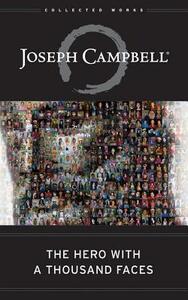Take a photo of a barcode or cover
hopeful
informative
inspiring
mysterious
reflective
sad
medium-paced
I’ve been so lied to this text says Nothing revolutionary and it’s far too forced in its ideas anyhow. Extremely disappointing and not worth finishing
This is a great book to understand narrative structures. Campbell takes a qualitative look at stories from cultures around the world, and breaks down mythological stories along a baseline.
This is one of those obligatory books for fantasy writers, so it was one of the first books I imported (so long ago that I don't even remember). It was, also, a kind of disappointment.
You see, this is a very interesting book, but it is much more about personal empowerment ("follow your bliss") and holistic thinking than about narrative or actual mythology. The Myth Cycle itself is interesting, of course, but the text does nothing to explain it that you couldn't find on a summary. There are great myths used as examples, but those are chopped to pieces.
So, if you think you should read this book to write better, don't. Go read Zen and The art of Writing or On Writing, it'll be better for your writing than this book.
You see, this is a very interesting book, but it is much more about personal empowerment ("follow your bliss") and holistic thinking than about narrative or actual mythology. The Myth Cycle itself is interesting, of course, but the text does nothing to explain it that you couldn't find on a summary. There are great myths used as examples, but those are chopped to pieces.
So, if you think you should read this book to write better, don't. Go read Zen and The art of Writing or On Writing, it'll be better for your writing than this book.
challenging
informative
reflective
slow-paced
challenging
hopeful
informative
inspiring
mysterious
reflective
slow-paced
I was meant to read this book in first year, but I’ve only just got round to it, lol. It took me ages to get through because I found it to be quite dense in comparison to what I usually read. I was constantly looking up words (and annotating them with their definitions), and of course I was highlighting passages, which also slowed things down... Campbell repeats himself a lot, also. He says the same thing a slightly different way a million times.
Some of the language/attitudes towards indigenous people, and people of colour in other situations, was poor and outdated. Not sure why the offensive terms weren’t changed in the recent edition for posterity.
All this to say, I learned a lot from the book - not just about mythology itself, but about the jargon that goes with it. I found a lot of it interesting, though, again, it is fairly repetitive.
Some of the language/attitudes towards indigenous people, and people of colour in other situations, was poor and outdated. Not sure why the offensive terms weren’t changed in the recent edition for posterity.
All this to say, I learned a lot from the book - not just about mythology itself, but about the jargon that goes with it. I found a lot of it interesting, though, again, it is fairly repetitive.
One of the greatest books I’ve ever read. I can only imagine the amount of time and research required to create such a book. Discerning the monomyth by synthesizing numerous civilizations’ and cultures’ mythologies is a feat in and of itself. Unfortunately, I feel there is something lacking. We know what the monomyth is, now what? How do we implement it into our lives? How and why did all of these mythologies arise? Is it due to a collective unconscious (due to human nature)? Or did it arise from formative events that our earliest shared ancestors experienced and passed down? The more I read this book the more questions I asked. Still would definitely recommend for anybody looking to learn more about the psychology/reasoning behind religion and mythology.
This book is fantastic if you have a really really weak and narrow understanding of mythology and human narrative convention.
If you're reading it for a class, there are more up to date and way less bias books to be getting on with.
The idea is great, that the stories we tell are directly built from interior schematics. But sometimes it's a stretch to neatly tar every tale with the same psychoanalytical paint roller.
I give this three stars because I really enjoyed the actual myth examples. They span a wide range of cultures and even if I'd heard most of them, being reminded of them was wonderful.
By the end though. It just seems a little... pointless reading it.
Next time I'll just pick up one of those anthologies of myths and folklore and sidestep all the psychobabble about my raging desire to metaphorically breastfeed.
If you're reading it for a class, there are more up to date and way less bias books to be getting on with.
The idea is great, that the stories we tell are directly built from interior schematics. But sometimes it's a stretch to neatly tar every tale with the same psychoanalytical paint roller.
I give this three stars because I really enjoyed the actual myth examples. They span a wide range of cultures and even if I'd heard most of them, being reminded of them was wonderful.
By the end though. It just seems a little... pointless reading it.
Next time I'll just pick up one of those anthologies of myths and folklore and sidestep all the psychobabble about my raging desire to metaphorically breastfeed.
There was a lot to digest in this book, and I think it will require a re-read some day. But overall I found it to be insightful and informative.





